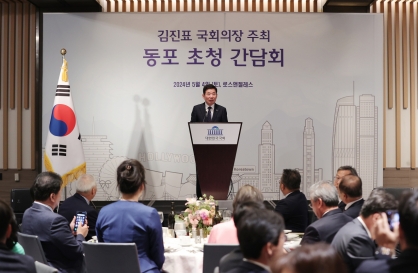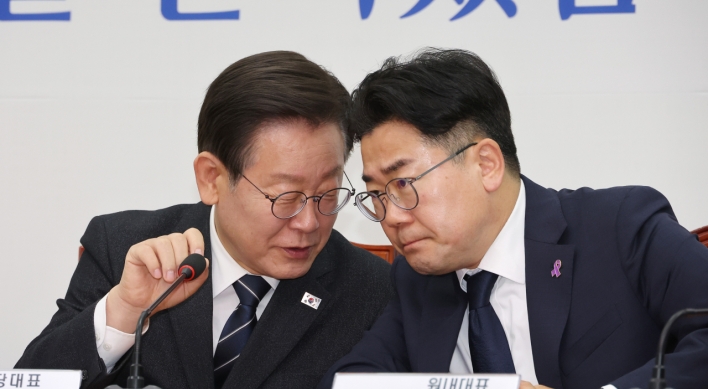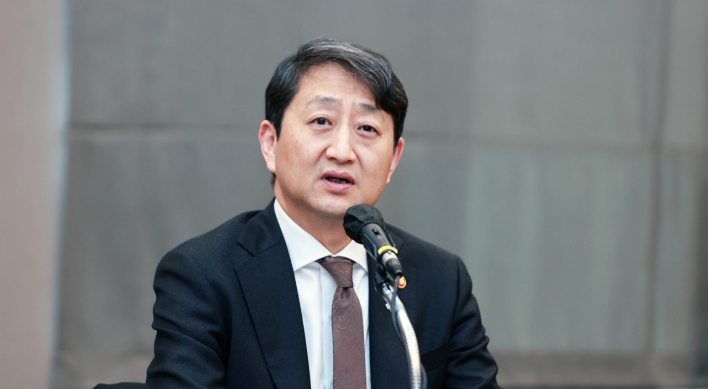Since the beginning of this year, the won has lost more than 4 percent of its value against the U.S. dollar. Among Asian currencies ― some of which have strengthened ― only the yen has weakened more.
Is there something serious going on?
The short answer is no. What economists call the fundamentals ― inflows and outflows for trade and investment, equity values, interest rates and so on ― are all sound enough. It’s more to do with general investor unease about what Japan is doing to reboot its economy, and what North Korea is up to (in so far as anyone can tell, and that’s the point).
If you look closely, you will see that daily ranges in the won-dollar rate are not unusual and there is not a lot of volatility, either. And other Korean assets are doing just fine. Only the won is bearing the brunt of the uncertainty. But fundamentally, there are no grounds for its underperformance, which only makes it more attractive down the line.
Let’s take a closer look at those fundamentals. While there have been equity and debt portfolio outflows, they have been limited and driven by one-off factors. Meanwhile, credit spreads ― the difference between what interest rates other borrowers have to pay compared with what the government does ― have not widened significantly compared to regional peers. Foreign investors continue to buy local currency debt. In fact, it seems the won’s weakness could be a function of investors temporarily hedging their underlying asset positions.
Then there is the all-important balance of payments, or BOP, which records all transactions between a country and the rest of the world. Between January and February, trade and other investment inflows have more than offset the portfolio and direct investment deficits, leaving no net overall outflows. We expect the portfolio account to remain in surplus this year, supported by the fact that the yields from Korean assets are still much higher than on similar assets in the major economies.
The capital account part of the BOP has been a drag on the won in recent years, partially driven by Korean banks’ and companies paying back short-term external borrowing. In fact, this is a good thing in the long run as it reduces the credit risk premium in the won and has contributed to the decline in broader volatility of the currency.
Korea’s trade surplus remains a key pillar of support. There is no doubt that a weaker yen is a potential threat, given that the two countries’ exports are highly similar. However, the negative implications are not completely clear cut for a number of reasons: the yen-won “cross” exchange rate is still high compared with what it was pre-2008, which means Korean exports are still relatively competitive; Chinese demand is skewed in favor of Korea over Japan; and if the yen moves sharply lower, this may increase the prices of Japan’s imports and dampen its competitiveness.
In addition, we also believe Korea’s overall BOP current account surplus is ensured by weak credit growth onshore, which has significantly curbed import demand. Given the persistent downward pressure in housing prices and prudent policy measures to curb excess borrowing, the weak trend in bank lending is likely to continue.
Meanwhile, there is a perception that foreign exchange policy in Korea has turned more defensive ― which implies the Bank of Korea has been in effect selling won for dollars to try to weaken the won. While the BOK’s foreign exchange forward book has indeed shown a sizable pick-up in recent months, this is not necessarily a policy aimed at directly weakening the won.
It is much more technical than that. In our view, the intention is to narrow the interest rate differential between foreign exchange implied yields and other money market rates, so as to reduce the private sector’s reliance over the previously “cheap” foreign exchange swap market.
What all this means is ― unpredictable North Korea, the eurozone debt crisis and Japan’s monetary easing risks aside ― the won is set for a moderate appreciation. We think it will reach 1,070 by the end of the year from its current level of 1,127 to the dollar.
Is there something serious going on?
The short answer is no. What economists call the fundamentals ― inflows and outflows for trade and investment, equity values, interest rates and so on ― are all sound enough. It’s more to do with general investor unease about what Japan is doing to reboot its economy, and what North Korea is up to (in so far as anyone can tell, and that’s the point).
If you look closely, you will see that daily ranges in the won-dollar rate are not unusual and there is not a lot of volatility, either. And other Korean assets are doing just fine. Only the won is bearing the brunt of the uncertainty. But fundamentally, there are no grounds for its underperformance, which only makes it more attractive down the line.
Let’s take a closer look at those fundamentals. While there have been equity and debt portfolio outflows, they have been limited and driven by one-off factors. Meanwhile, credit spreads ― the difference between what interest rates other borrowers have to pay compared with what the government does ― have not widened significantly compared to regional peers. Foreign investors continue to buy local currency debt. In fact, it seems the won’s weakness could be a function of investors temporarily hedging their underlying asset positions.
Then there is the all-important balance of payments, or BOP, which records all transactions between a country and the rest of the world. Between January and February, trade and other investment inflows have more than offset the portfolio and direct investment deficits, leaving no net overall outflows. We expect the portfolio account to remain in surplus this year, supported by the fact that the yields from Korean assets are still much higher than on similar assets in the major economies.
The capital account part of the BOP has been a drag on the won in recent years, partially driven by Korean banks’ and companies paying back short-term external borrowing. In fact, this is a good thing in the long run as it reduces the credit risk premium in the won and has contributed to the decline in broader volatility of the currency.
Korea’s trade surplus remains a key pillar of support. There is no doubt that a weaker yen is a potential threat, given that the two countries’ exports are highly similar. However, the negative implications are not completely clear cut for a number of reasons: the yen-won “cross” exchange rate is still high compared with what it was pre-2008, which means Korean exports are still relatively competitive; Chinese demand is skewed in favor of Korea over Japan; and if the yen moves sharply lower, this may increase the prices of Japan’s imports and dampen its competitiveness.
In addition, we also believe Korea’s overall BOP current account surplus is ensured by weak credit growth onshore, which has significantly curbed import demand. Given the persistent downward pressure in housing prices and prudent policy measures to curb excess borrowing, the weak trend in bank lending is likely to continue.
Meanwhile, there is a perception that foreign exchange policy in Korea has turned more defensive ― which implies the Bank of Korea has been in effect selling won for dollars to try to weaken the won. While the BOK’s foreign exchange forward book has indeed shown a sizable pick-up in recent months, this is not necessarily a policy aimed at directly weakening the won.
It is much more technical than that. In our view, the intention is to narrow the interest rate differential between foreign exchange implied yields and other money market rates, so as to reduce the private sector’s reliance over the previously “cheap” foreign exchange swap market.
What all this means is ― unpredictable North Korea, the eurozone debt crisis and Japan’s monetary easing risks aside ― the won is set for a moderate appreciation. We think it will reach 1,070 by the end of the year from its current level of 1,127 to the dollar.

By Ju Wang
The writer is a senior foreign exchange strategist for HSBC. The opinions reflected in the article are her own. ― Ed.
-
Articles by Korea Herald







![[KH Explains] Can tech firms' AI alliances take on Nvidia?](http://res.heraldm.com/phpwas/restmb_idxmake.php?idx=644&simg=/content/image/2024/05/07/20240507050619_0.jpg&u=)


![[Grace Kao, Meera Choi] Has money displaced romance on dates?](http://res.heraldm.com/phpwas/restmb_idxmake.php?idx=644&simg=/content/image/2024/05/06/20240506050233_0.jpg&u=)








